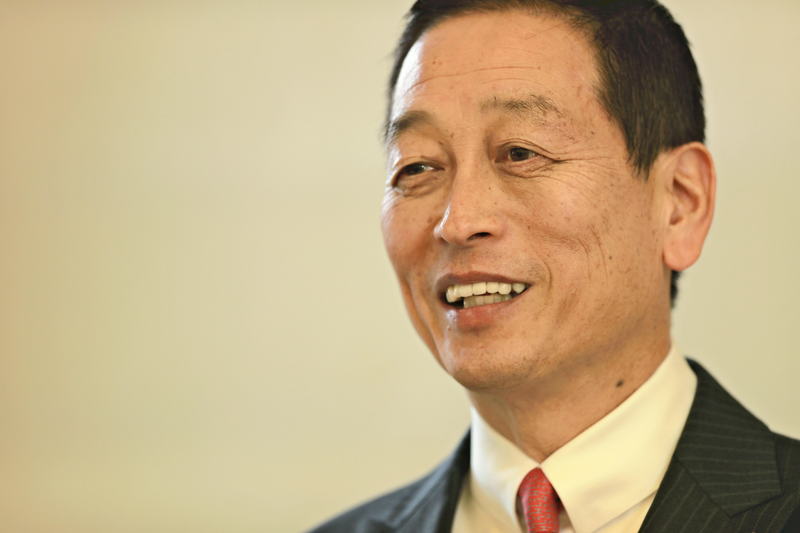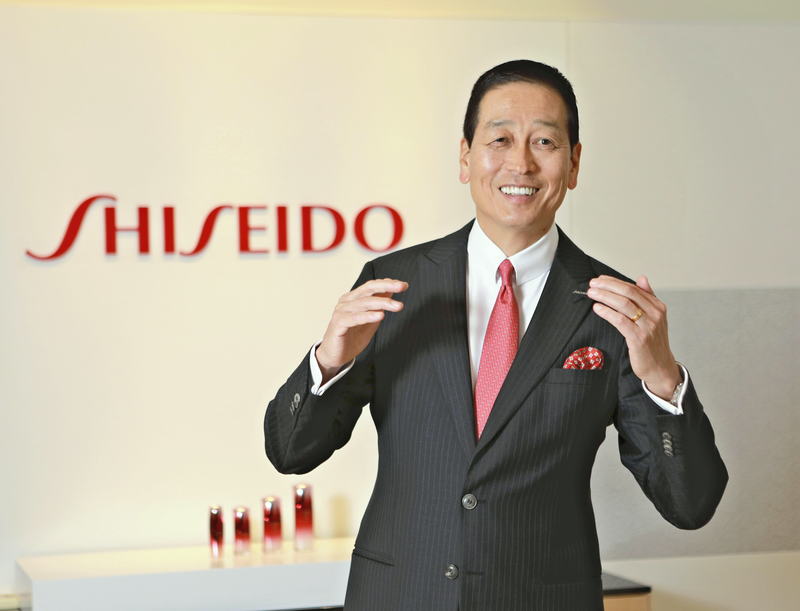
Leading Japanese cosmetics manufacturer Shiseido Co. is improving its performance by meeting demand in China and other parts of Asia. In this installment of The Leaders, a column featuring corporate management and senior executives, The Yomiuri Shimbun asked President and Chief Executive Officer Masahiko Uotani about Shiseido's strategy and challenges.
"Is this ELIXIR [a Shiseido cosmetics brand] product for your personal use, or is it a gift?" I go to the Harajuku district in Tokyo often. When I see Chinese consumers in cosmetics stores, I ask them all kinds of questions through an interpreter. "How often do you come to Japan?"

According to their answers, there are many young customers who go to the same store time and again.
The global economy's center of gravity is shifting toward China and Asia. The number of Chinese visiting Japan will grow to 10 million in 2020. The "world's factory" has now become the center of consumption, and in the future it may replace the United States as the world's largest cosmetics market. Who's buying what? When you actually ask people at the point of sale, several things become clear.
Chinese consumers hold "Made in Japan" products in high regard, especially when it comes to skincare cosmetics. Last year, we switched the production base for ELIXIR products sold in China from Vietnam to Japan. As fellow Asians, they share the same consciousness about skin whitening as Japanese do. Technologies and products that succeed in Japan should also be successful in China.
[From 2019, Shiseido will start operating new factories in Tochigi and Osaka prefectures. They will be the first new factories the company has opened in Japan in 36 years.]
To succeed in the global market, you need to be able to sufficiently supply high-quality products. The production capacity of the new factory in Osaka will be double what was initially planned. This is to maintain the supply of products for both the domestic and foreign markets.
There is also considerable room for growth in demand from inbound travelers. Accommodating consumers who travel around the world is essential. "Travel retail [TR]" at duty-free shops in airports is one of our most important business sectors.
In the past, we did not place much importance on duty-free shops. You wouldn't even have seen Shiseido cosmetics among the in-flight sales products of Japanese airlines. Personally, before coming to Shiseido, I bought cosmetics from other brands.
We have divided the world into areas and set up regional headquarters, and TR was positioned as one of them. I conferred with the top people at TR, and moved the home base from Paris to Singapore, an Asian travel hub. After delegating responsibility and authority to them, TR's annual sales had increased 79 percent in December 2017 compared to the year before -- growth that far outstrips our targets.
Difference creates value
Promoting diversity is essential for strengthening global expansion. In Japan, 30 percent of our managers are female. If most of the people in management meetings are older men, the discussion will be one-sided.
Before coming to Shiseido, I served as president and chairman of Coca-Cola (Japan) Co. My experience with the internationalization of personnel from that time is extremely powerful. The five CEOs of the U.S. headquarters I worked with were also of various nationalities. By expanding operations internationally, people with different religions, languages and values come together to sell the products of a single brand.
People of 66 nationalities work at Shiseido. There are young people as well as seniors with a wealth of experience. I came from the outside, so from the perspective of someone who rose within Shiseido, there were certainly some bewildering things about me. There may be some people who feel I go against the way things used to be done, but "difference" itself creates value.
Beverages and cosmetics are similar in that they have strong connections to culture. I think my experience at Coca-Cola (Japan) is applicable to the cosmetics industry.
My view is that human nature is fundamentally good. The regional headquarters system confers responsibilities and authority to leaders who understand local conditions, and the head office has a strong commitment to their support. This has also served to attract the best people. Whether East or West, people demonstrate their abilities when they feel trusted. I've also learned this from experience.
[In January, Shiseido purchased a technology called "second skin," which instantly conceals wrinkles, from a U.S. firm.]
In terms of technology, there are things we cannot see if we stay within the world of Shiseido. By combining the things out there with our own technologies, we can create new things. The domain of "beauty" has gotten closer to the worlds of health and medicine. How do we satisfy the different needs of individuals? We want to be the first in the world to provide the answer to that question.
Starting in October, we will make English the official language at our head office. When only Japanese attend a meeting, there will be implicit understanding. However, if a foreigner [participates in the meeting and] asks "why?" [in English], an explanation will be needed [in English]. This can serve to reveal the true nature of things. Also, employees can just address even the president as "you," which lowers barriers between the executives and the employees.
Learning leads to growth
[Due to a slump in domestic sales, Shiseido fell into the red according to its March 2013 consolidated fiscal report. Uotani was appointed president and tasked with reorganizing management.]
There were some conflicts before I accepted. This was immediately after I founded my own consulting company. When I brought up the offer I had received from Shiseido, one of the partners angrily responded: "That's irresponsible. What's going to happen to those of us left behind?" It was a natural response. Uotani's running things, so work will come in. So I told Shiseido that it would be difficult to accept the offer.
However, four or five days later, the same person said to me: "We need to talk. We gave it a lot of thought. Your ambition is supposed to be to make Japanese companies internationally competitive. You should go to Shiseido. The rest of us will find a way to keep the company going." Saying this, he encouraged me. What more could a man hope for?
I value communication with staff. Just after taking my post, I spent two days visiting all of the floors in the company. I met a total of 70,000 people at various meetings. Because even when the door of a president's office is left open, nobody will come.
How should one respond when times are difficult for business? Use consultants, and ask people on the outside for help. There are many different approaches -- it is the employees who have the answers.
There are no managers who can do a perfect job from the start. The business environment changes from moment to moment. The past four years have been a learning period for me as well. What should the president of a listed company do? I started from zero, but feel that I have achieved incredible growth.
Today, I believe managing Shiseido is my calling. In my first job at Lion, they gave me the opportunity to study overseas, and I dabbled in marketing. I also worked at a global company, Coca Cola, for 18 years. Shouldn't I make the most of that great body of experience here?
"I will lay down my life for it." I used these words spontaneously to express my determination at the press conference when I took my post. In my prepared notes, it said, "I will devote myself to the best of my ability." But that would not be enough. My feelings have not changed since.
-- Masahiko Uotani / President and CEO of Shiseido Co.
Uotani was born in Nara Prefecture in 1954. He graduated from Doshisha University in 1977 and joined Lion Dentifrice Co. (now Lion Corp.). He received an MBA from Columbia University in the United States. He joined Coca-Cola (Japan) Co. as senior vice president in 1994, and became president in 2001, then chairman in 2006. Uotani assumed his current post in April 2014.
-- Key Numbers: 1 trillion yen.
Shiseido's consolidated sales in the year ending December 2017 were about 1 trillion yen. The company achieved its target of 1 trillion yen in sales, set in a six-year management plan established in 2014, three years ahead of schedule. Shiseido's domestic sales of high-priced cosmetics are healthy, and growth in its Asian business, centered in China, is also strong. The company was founded in 1872. It has about 46,000 employees globally.
Read more from The Japan News at https://japannews.yomiuri.co.jp/







